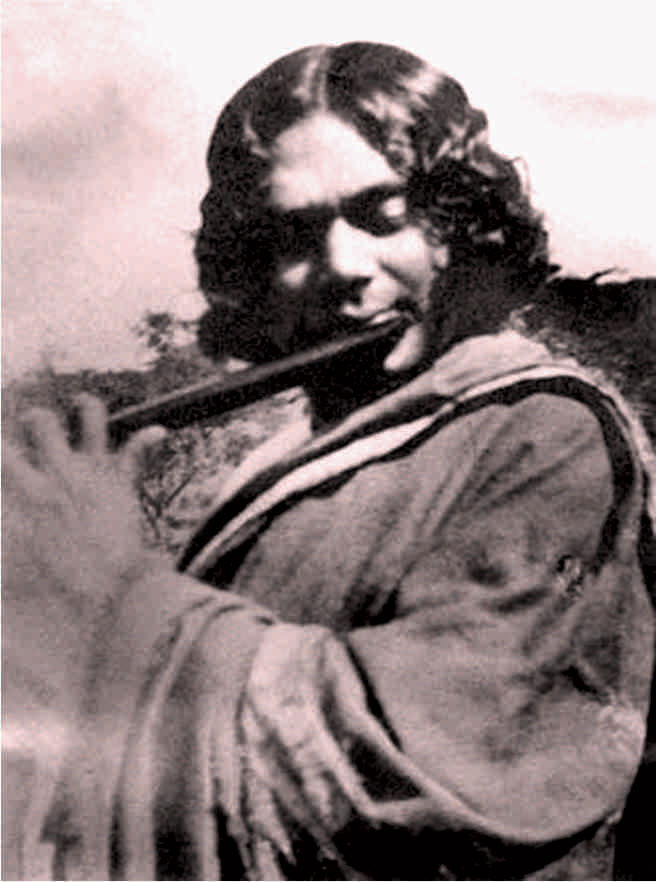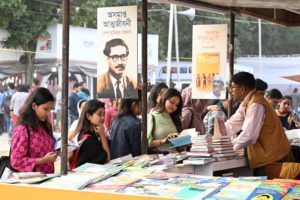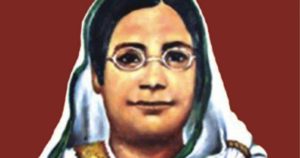Bangladesh’s National Poet a.k.a. “The Rebel Poet”

Bangladesh’s National Poet a.k.a. “The Rebel
Poet”
By Rumki Chowdhury
One of the greatest Bangladeshi poets of all-time was also known as “The Rebel Poet” because of his controversial themes: Kazi Nazrul Islam. He was one of the few poets to intertwine Muslim, Hindu, Christian and Greek mythological philosophies into his poetry, stories and songs. His themes of love, poverty, gender equality, freedom or independence, surrounded a much larger theme: rebellion against the societal norms of his time. His poetry was a means to lead a revolution against any kind of bigotry, especially against British Imperialism.
Kazi Nazrul Islam was not only a poet, singer/songwriter, an Editor and Founder of his own magazine, but also, a soldier against British Imperialism. In 1922, he created a bi-weekly magazine entitled, “Dhamketu” which aroused suspicion among the British authorities. Eventually, he was jailed in his birth city, Kolkata (Calcutta). In return, he protested through fasting for 40 days and composing poetry and songs about imprisonment, colonialism and inequality. When he was finally released from prison, he was banned from composing poetry or songs. Regardless, in 1924, he wrote a poem, “Bidrohi,” translated to “The Rebel:”
Weary of struggles, I, the great rebel,
Shall rest in quiet only when I find
The sky and the air free of the piteous groans of the oppressed.
Only when the battle fields are cleared of jingling bloody sabres
Shall I, weary of struggles, rest in quiet,
I the great rebel.
Another poem he wrote was entitled, “Daridro,” translated to “Poverty:”
O poverty, thou hast made me great.
Thou hast made me honoured like Christ
With his crown of thorns. Thou hast given me
Courage to reveal all. To thee I owe
My insolent, naked eyes and sharp tongue.
Thy curse has turned my violin to a sword…
O proud saint, thy terrible fire
Has rendered my heaven barren.
O my child, my darling one
I could not give thee even a drop of milk
No right have I to rejoice.
Poverty weeps within my doors forever
As my spouse and my child.
Who will play the flute?
One immediately notices the mention of “Christ,” which shows Kazi Nazrul Islam’s blend of all religious philosophies into his compositions. Another vital part of Kazi Nazrul Islam’s poetry was song-writing and he would do this on-the-spot. For example, in 1926, he is pictured playing the flute in Chittagong. He was invited up to a podium to perform, but he never remembered most of his “magical chants” as they were dubbed by The Daily Star; rather, he penciled down verses, right then and there, before finally entrancing his audience.
Thus, Kazi Nazrul Islam pioneered the Bengali ghazals, which is poetry, composed of five to fifteen lines, each line is the same length and focuses on one theme. He wrote and composed music in a total of 3000 songs altogether known as the Nazrul Sangeet (Nazrul songs).
As explained earlier, Kazi Nazrul Islam was all about fighting for inlusivity and equality. Thus, we have here an excerpt from “Nari,” translated to “Woman:”
All the flowers blossomed in the world,
and all the fruits grown,
isn’t in beauty, nectar and fragrance of those
woman’s contribution?
Have you seen Taj Mahal’s marble?
It’s spirit, have you seen?
At the heart of it Momtaj, woman;
outside is Shahjahan, the King and lover so keen.
Here, he mentioned the reasons why women should be respected, making beautiful references to flowers, fruits and the Taj Mahal. Therefore, he makes the point of varying representations of women’s crucial contributions to our society.
In 1942, this 43-year-old poet who had projected his work both orally and in written form, with such emotional force and impact, began showing signs of Pick’s Disease. This disease is a rare type of dementia which affects the emotional, behavioral and language parts of the brain. Sadly, Kazi Nazrul Islam eventually lost his voice and memory. In 1972, he moved to Dhaka, having been granted citizenship and the title of “National Poet,” in the newly independent nation of Bangladesh. He passed away four years later, but his compositions still inspire us to this day:
“Come brother Hindu! Come Musalman! Come Buddhist! Come Christian! Let us transcend all barriers, let us forsake forever all smallness, all lies, all selfishness and let us call brothers as brothers. We shall quarrel no more.”
Sources:
https://www.poemhunter.com/poem/woman-121/
https://www.newworldencyclopedia.org/entry/Kazi_Nazrul_Islam
https://bengallights.com/detail.php?aid=21
https://www.quoteikon.com/kazi-nazrul-islam-quotes.html
Image Source:
https://www.thedailystar.net/melodies-of-nazrul-38923
of Kazi Nazrul Islam playing the flute in Chittagong in 1926

Read More
The Legacy of Boi Mela
Every year in February, the month-long national book fair welcomes...
Read MoreMillennial Amma: How to Explain a Global Crisis As a Parent
Rumki Chowdhury shares tips for how to talk to children...
Read MoreBegum Rokeya’s Millennials
A tribute to a pioneering Bengali feminist writer, educator and...
Read More



